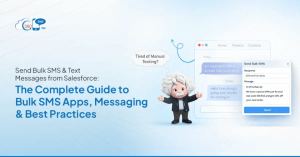A wide range of phone numbers like SMS long code, SMS shortcode, and alphanumeric sender identity makes it challenging for businesses to choose the ideal sender identity. Every type of sender identity serves a specific purpose. Thus, one should be cautious while selecting a type of phone number for their business. These numbers act as a sender identity for an organization and as a backbone for texting campaigns. Failing to select the appropriate sender identity can adversely affect the goal you want to achieve. Here are various aspects of shortcodes that’ll help you find when and why to choose shortcodes for business messaging.
Table of Contents
What are SMS Shortcodes?
A shortcode is a 5-8 digit long phone number used by business ventures for messaging. The length of shortcodes varies depending on the country from which a firm is sending text messages.
People can easily opt into various Salesforce text programs by texting a specified keyword to the company’s shortcode.
Types of SMS Shortcodes
-
Random
As the name indicates, random shortcodes are selected randomly and assigned to you if you choose a random shortcode. These are also called non-vanity shortcodes, and you have no control over them.
-
Vanity
A vanity shortcode is a shortcode assigned as per the choice of a company. If a firm needs a specific shortcode, it can choose a vanity shortcode as you have the option to select a specific shortcode.
-
FTEU
FTEU is a shortcode that stands for Free to End User. In many countries, customers are charged for receiving and sending messages both.
But if a firm uses FTEU to send messages, the customers do not have to pay to receive or send messages as the brand will bear the cost on the customer’s behalf.
FTEU can be the best pick to maximize responses without worrying about SMS charges.
Why and When to Use SMS Shortcodes
Easy to Remember
One of the best reasons to use shortcodes is they are easy to remember and support two-way messaging. Its easy-to-remember capability makes it ideal for branding too.
The moment a customer receives a text from a dedicated shortcode, a person can easily recognize that number as brand identity. That’s how you can easily improve brand recall.
What makes shortcodes more reliable is a delivery receipt which is not available in the case of long codes.
When you send SMS from shortcodes, texts do not end up in spam folders. This is because the U.S. government sends these shortcodes and all the templates are pre-approved by the carriers. Thus, you get better SMS deliverability.
When to use Shortcodes
Choosing between a long code and a shortcode is a tough task but if you’re well-acquainted with both types of application numbers you can easily make the right choice. One of the major advantages of shortcodes is that no other type of sender identity can provide is the large volume of message handling capacity.
With shortcodes, you can send 200 messages per second. Ultimately, you can send millions of messages in a day and perform bulk texting conveniently.
This is what makes it work the most for business communications because, for most use cases, businesses need to send messages in
Push High Volume of Messages Without Landing in Spam Folders
Shortcodes are the best pick when users intend to send a high volume of messages and run SMS marketing campaigns instead of conversational messages. Though shortcodes are a bit expensive compared to long codes, the unique value that shortcodes add in long term brings in more revenue, brand recognition, and business growth.
Even if you want to bring your own number, that’s also possible. To gather more information on this, get in touch with our experts at care@360smsapp.com or contact us here.
Recent Blogs

Send Bulk SMS & Text Messages from Salesforce: The Complete Guide
Listen to this article If you’ve ever tried reaching hundreds—or thousands—of customers one message at a time, you already know…

WeChat Integration for Messaging: Common Pitfalls and Solutions
Listen to this article WeChat is one of the most popular social media channels for global messaging, with an extremely…

What Is a Salesforce Chatbot? The Secret Tool Boosting Sales by 300%
Listen to this article Over the past decade, sales teams have seen an explosion of automation tools, but few innovations…















